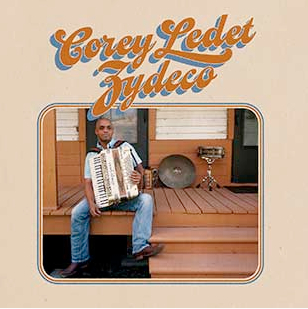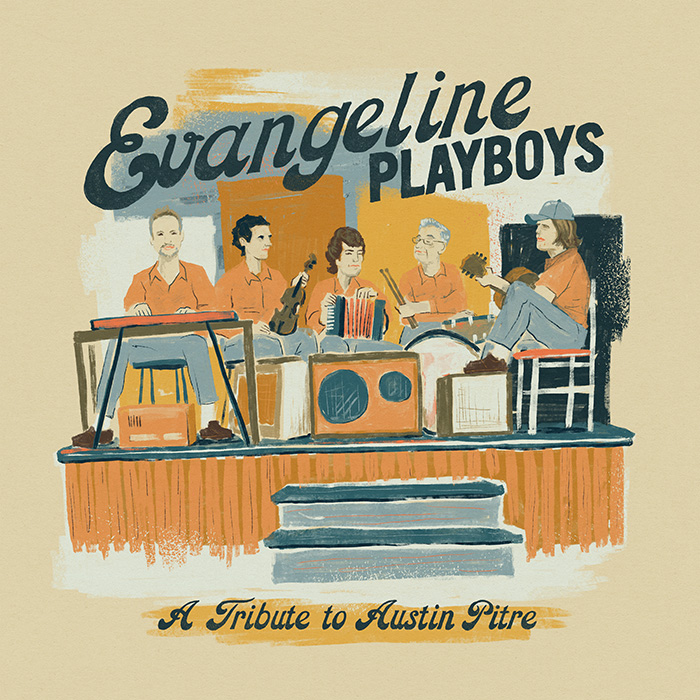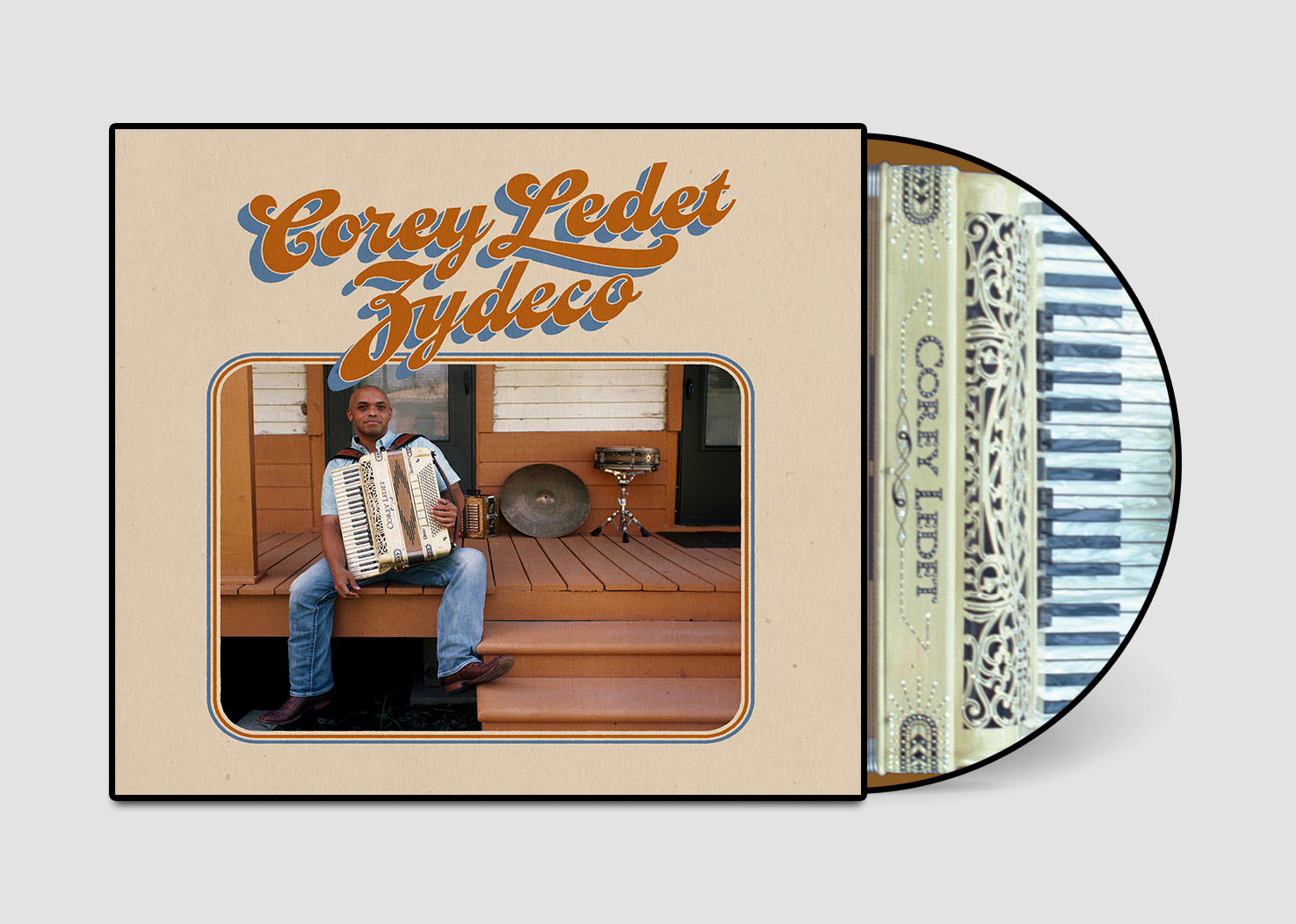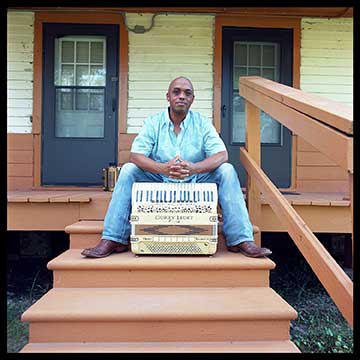Corey Ledet Zydeco turns 5 years old! 1 February 2026
The Iconic self-titled release from Corey Ledet has been making waves for 5 years now! Check it out:

The Iconic self-titled release from Corey Ledet has been making waves for 5 years now! Check it out:

The first release by Houma Records in over 50 years MARDI GRAS CREEP / THE MOUTH OF HARAHAN (Ballad of King Louie Bankston) is out Feb 13, Mardi Gras day, 2024. BUY NOW
The A side, a mysterious tune about the darker forces of Mardi Gras, has finally made it back onto wax thanks to the 2022 rebirth of Houma Records, a small Louisiana "Swamp Pop" label which was active from the 1960s through the 1980s. The label originally released "Mardi Gras Creep" in the 80s as a B side to "Weld This Broken Heart (Roughneck Blues)", another Bobby M.G. original.
There is still not much known about Bobby M.G. (the "M.G." stands for Mardi Gras) other than the fact that he originally hails from Joplin Missouri and lived in Houma for about 10 years working in the oil industry. It was there that he met his future wife Bobbie and started performing with her under this band name. Houma Records’ original owner, Eldridge Robichaux discovered the group performing at the wedding of a mutual friend. The Houma Record label is now run by Robichaux's son Anthony "AJ" Rodrigue. The town of Houma, where the label began and remains, was named for the Native American tribe who originally populated that region of Southeast Louisiana.
Each single is numbered and hand-stamped with the new Houma Records logo.
The B side, "The Mouth of Harahan" is Quintron's ode to the life of fellow New Orleans rocker, King Louie Bankston who passed away on February 13th, 2022.
SONG TITLE SIDE A: MARDI GRAS CREEP
ARTIST: BOBBY M.G. & THE QREEPS
Words and music by David Rolston (BMI)
MUSICIANS: Bobby MG - vocals, piano; Bobbie MG - vocals, spoons; Luke Stewart - double bass, voiceover; Benoit Devin’ – squawker; Kroger Samuel – drums; Kunaal LeCashe – guitar; Louis Michot – accordion; Dani Cliffton – guitar; Bruye’re Vinz - horn
SONG TITLE SIDE B: THE MOUTH OF HARAHAN (Ballad of King Louie Bankston)
ARTIST: QUINTRON AND MISS PUSSYCAT
Words and music by Quintron (BMI)
MUSICIANS: Quintron - organ, vocals, Drum Buddy; Kunal Prakash - guitar; Sam Yoger - drums; Benny
Divine - Talkbox
As the Full Super Blue Moon was setting on August 31, so was premiering "Boscoyo Fleaux" feat. Dickie Landry & the Ivory Billed Woodpecker, the first music video from Louis Michot's debut solo LP, 'Rêve du Troubadour'.
"Boscoyo Fleaux" from Louis Michot's debut solo album 'Rêve du Troubadour'.
Directed by Syd Horn & Olivia Perillo
Produced by Louis Michot & Honest Art
Cinematography & Color by Olivia Perillo
Additional Camera by Syd Horn
Edit & Animation by Joseph Howard
Ivory Billed Woodpecker drawing by Pippin Frisbie-calder
Louis Michot- vocals, Syndrum, 808 kick and snare, steel guitar
Dickie Landry- saxophone
Ivory Billed Woodpecker recorded by Arthur A. Allen, 1935, Singer Tract, Louisiana
Engineered by Louis Michot.
Additional Engineering by Kirkland Middleton
Mastered by Bob Weston, Chicago Mastering Services
In Louis' words: "‘Boscoyo Fleaux’ is a swamp-rap song I composed on my birthday in 2022, as I took a solo trek to get lost in the wilderness. As I would walk, following the palmetto filled contour lines to stay above the mud, I would sit on a dry log to continue writing the lyrics as they came to the rhythm of my hike. One thought came to mind, as I was writing in the endangered dialects of Cajun and Creole French; that the Louisiana French language could be likened to the elusive bird who has been dodging extinction for the last hundred years: the Ivory Billed Woodpecker. As I searched thru the hidden swamp for myself, and the solace of nature, I was reminded of my father, Tommy Michot, who has been searching for the Ivory Billed Woodpecker for almost 5 decades now. Thought to be extinct since the 1940s because of loss of habitat due to deforestation of the old-growth forests cut for lumber, there are those, such as my father, who believe the majestic woodpecker is still alive and breeding, hiding from humanity to keep its species alive. My father and his colleagues have recently published recordings of the call of the Ivory Billed Woodpecker, recorded in an undisclosed location in Louisiana over the last few years. The Ivory Billed Woodpecker has been given musical references for centuries now, with John James Audubon describing the call of the Ivory billed Woodpecker in 1831 as "resembling the high false note of a clarinet" and in 1932 ornithologist Frank Chapman used the analogy of "a nasal yap sound of a tin trumpet". I asked avant-garde saxophonist Dickie Landry, who lives only a few miles down Bayou Teche in Cecilia, if he would lend his freestyle interpretation in his signature "quadrophonic" delay style to this Louisiana French nature-rap track, to which he agreed, driving up and perfectly melding his sound onto the rhythms. I then sampled the 1935 recording of the Ivory Billed Woodpecker by Arthur Allen, and laid it in the track, an appropriate accompaniment to Dickie's performance."
Rêve du Troubadour is the first solo album from Louis Michot, fiddler songwriter and lead vocalist for Grammy winners Lost Bayou Ramblers. Special guests on these recordings include Nigerian Tuareg guitar wizard Bombino, and critically acclaimed singer / cellist Leyla McCalla among others. Kirkland Middleton of the Ramblers engineered and mixed the album at Nina Highway Studios in Arnaudville, Louisiana with various musicians building on basic tracks Louis had recorded at his home, houseboat studio. Rêve du Troubadour is being released by Nouveau Electric Records on September 22 on CD, streaming platforms and digital download as well as 12" LP vinyl. The LP will be pressed on Ivory-Billed Woodpecker inspired red and black marbled vinyl and include a four panel insert with the lyrics in Louisiana French and English.

Corey Ledet Zydeco's Médikamen is his first zydeco album written and performed completely in Kouri-Vini (Louisiana Creole) as an homage on Corey's journey to reclaim his family’s language. This project was made with an aspect of creation heavily inspired by his ancestors and culture. It’s more than just his next record, this is art that he is proud of no matter the reception. Celebrating 20 years and being comfortable as an accordionist and songwriter, Corey’s reclaiming the language and making this music are two ways in which he takes part in Creole culture today. Special guests include Germaine Jack, Anders Osborne, Kermit Ruffins, and Grant Dermody.
Set for release on March 10, ‘A Tribute to Austin Pitre’ features original members of the Evangeline Playboys Allen (T-Lan) Ardoin on fiddle, Eston Bellow on drums, Junior Martin on steel guitar, and a former drummer of Pitre’s band, Mike Tate, playing accordion in the late bandleaders’ place. Bobby Michot, joins the Evangeline Playboys on guitar and vocals.

Austin Pitre and the Evangeline Playboys represent a golden age of Cajun music, when dancehalls were packed every weekend, and bands were electrifying the generations of repertoire passed on in Cajun and Creole households, giving new life to old melodies, and making new songs that are still standards today. Born in Ville Platte, Louisiana, Pitre drew from diverse influences; traditional dances and tunes, the blues, and nursery rhymes, and popular music of his time.
Mike Tate’s accordion style is as close as one can get to that of Austin Pitre himself, and that is no coincidence, as Tate was hugely inspired by his late bandleader’s mastery of the instrument. As recounted by Fred Charlie: “Mike's love of Cajun music was easy to see, growing up with him. His idol of course was, Austin Pitre. The ones that knew Mike, could hear it in his accordion playing”.Though Eston Bellow was the main drummer for the band, Mike Tate is featured on the famous recording of ‘Les flammes d’enfer’ (The Flames of Hell) recorded in the late 1960s by Ralph Rinzler for the Newport Folk Foundation.
Recorded in 1999 at T-Lan’s outdoor kitchen in Opelousas, LA, The Evangeline Playboys’ “Tribute to Austin Pitre” not only brings Pitre’s music back to life, but is also a rare true representation of a Cajun musicians house jam, often cooking for his musical friends, while playing hours of tunes with no audience, just for themselves. A typical host will keep starting song after song, while the musicians grow hungrier, and perhaps more buzzed, as he knows once he serves the meal the music may be done for the evening. It takes hours to make a good sauce piquant or a courtboullion, so the jam can last hours before the meal is ready. This record was made during a few such occasions.
COREY LEDET ZYDECO became the 2nd GRAMMY® nomination for Corey Ledet on his 2021 self-titled release. The album was nominated in the Regional Roots category for the 2021 awards, marking the first nomination for Nouveau Electric Records, and the second nomination for Corey Ledet after his 2012 nomination for “Nothin' But The Best" as Corey Ledet and his Zydeco Band. The 64th GRAMMY® Awards will be held on January 31.

Working towards promoting the cultural heritage of his family’s hometown of Parks, Louisiana, he studied and incorporated Kouri-Vini, a regional dialect spoken by family members into songs on this album.
Corey Ledet Zydeco was produced by Ledet and Louis Michot, recorded at Dockside Studios, Maurice, Louisiana, June 2019 with Justin Tocket engineering and mixing. It was mastered by Mark Bingham at Nina Hwy Studio, nearby in Henderson. Corey is featured on lead, harmony and background vocals, accordion, drums and washboard. He was joined in the studio by Cecil Green on Hammond B3 organ, bassist Lee Allen Zeno, harmonica player Grant Dermody, Julian Primeaux on rhythm and lead guitar and backing vocals, and Gerard Delafose on drums and washboard.
 Tiny Island was recorded and filmed by firelight on the night of March 6 on – yes, a tiny island -- in a small pond on Michot's home in Prairie Des Femmes, Louisiana. Played entirely live, the performance was put together for a tour stop on Ned Sublette and Ariana Hall's NOLA Reconnect, a virtual visit to Louisiana with attendees from all over America and Europe. Featuring a deep sonic collaboration with the tiny island’s frog and insect population, the set captures a more intimate and acoustic performance than the higher-decibel, psychedelic shows the Melody Makers are known for.
Tiny Island was recorded and filmed by firelight on the night of March 6 on – yes, a tiny island -- in a small pond on Michot's home in Prairie Des Femmes, Louisiana. Played entirely live, the performance was put together for a tour stop on Ned Sublette and Ariana Hall's NOLA Reconnect, a virtual visit to Louisiana with attendees from all over America and Europe. Featuring a deep sonic collaboration with the tiny island’s frog and insect population, the set captures a more intimate and acoustic performance than the higher-decibel, psychedelic shows the Melody Makers are known for.
Their joint repertoire of Cajun and Haitian, Créole and Kréyol songs -- both original and traditional -- coalesced in 2016 when Leyla joined String Noise for a special set at Louis's residency at The Stone in NYC in 2016 (released in 2020 on Nouveau Electric as Le String Noise under the L.E.S. Douze collection). Leyla first joined Michot's Melody Makers at New Orleans’s Music Box Village for a socially distanced show in November of 2020, and the outfit continued working together on outdoor shows at the Broadside Theater throughout the months of canceled touring.
Tiny Island is set for release September 25 as a video EP and as a digital audio EP on on Louis Michot’s own Nouveau Electric Records. The package was executive-produced by Ned Sublette, produced by Louis Michot, recorded by Kirkland Middleton, and mixed by Mark Bingham. The film was made by Connor Reever and Samuel Aguirre-Kelly for Fast Friends Productions. NOLA Reconnect was produced by Ned Sublette and Ariana Hall for Postmambo Studies and Cubanola Collective.
Featuring Cassie Watson Francillon on concert harp, Smith on drums and electronics and Webre (Lost Bayou Ramblers and Michot’s Melody Makers) on bass and electronics, Shakespeare & the Blues makes instrumental experimental music drawing on Jazz and Hip Hop influences.
The songs on e.g,rhapsodic are uninhibited explorations of genre blending, tied together by futurist grooves and virtuosic syncopating. They are composed around a startling selection of samples and soundbytes enmeshed in the trio’s visionary instrumental experimentation.
Shakespeare & The Blues originated from an improve performance in
New Orleans, and found it's way to Piety Studios at Nina Hwy in
Henderson, Louisiana, where the band self-produced this instrumental
sonic submersion of an LP.

Set for release on June 19, Creole House Dance, featuring 101 year-old Creole fiddler Willie Durisseau (1918-2019), is a voyage back in time to the 1930s, in Lebeau, Louisiana, when Creole house music was played every weekend at a different house on fiddle and guitar, no accordion.
Though the recordings were made in 2019, in the last months of Willie's long life, the songs came straight from the memories of he and his late brother Jimmy, and the many nights they spent playing music for the community by lantern light. Creole House Dance features two tracks, each comprising three small songs, some of which represent a pre-WWII Creole fiddle style that has never been recorded before. These performances were captured by Louis Michot (singer/fiddler of Grammy winners Lost Bayou Ramblers and founder of NER) on a Zoom stereo recorder at the Durisseau home in Spring of 2019. Creole House Dance will be released as a 45RPM vinyl 7,” digital download and via streaming platforms.

As Willie and his wife Irma recounted their memories of the Creole house dances of the 1930s to Michot, Durisseau would pick up his fiddle and allow his fingers to recall the songs he and his late brother, Jimmy Durisseau, played back then in their native, Lebeau, Louisiana. In their community, musicians performed exclusively on fiddle(s) and guitar, with no accordion. Creole House Dance provides 21st century music lovers with a vivid snapshot of those celebratory weekly affairs.
The Rayo Brothers' second release with Nouveau Electric Records is a
single titled ‘Undead’. It is the story of a love-sick soul stuck in
limbo after a relationship has ended, unready or unable to move on. The
song’s cheery, almost-surf-folk vibe provided by the strumming guitar,
rolling banjo, and grooving rhythm section is offset by beautifully dark
lyric imagery, lush melancholic strings, and a haunting far-off voice
whistling the hook. It has a unique feel for these Americana folk
rockers both lyrically and musically. ‘Undead’ was recorded, mixed, and
mastered by Grammy-winning engineer Tony Daigle at Electric Comoland
Studio in Lafayette, Louisiana.
For his 14th album, Corey Ledet gives his musical brand and band a new name: Corey Ledet Zydeco.
On this first self-titled release, Corey Ledet Zydeco pays homage to Ledet’s family and musical heritage which are inextricably combined. His great-grandfather, Gabriel Ledet, played professionally with the colorful early Jazz legend Bunk Johnson as an upright bassist. Grandfather, Buchanan played drums with Clifton Chenier and Rockin’ Dopsie, as Zydeco’s first drummer and invented the twice-pumped bass drumming pattern called “double clutching” that’s been an integral part of the genre ever since. Numerous members of this extended French speaking Creole family followed in their footsteps, playing professionally and non-professionally in the decades that followed. Corey’s rise to Zydeco royalty in the 21st century was a fait accompli.

Corey Ledet was born and raised in Houston, Texas, and spent his Summers with relatives in small-town Parks, where he was exposed to their Kouri-Veni language and Creole traditions. This molded and shaped Corey’s world in a profound way. This culture has its roots in Louisiana, but eventually spread across the country, including into neighboring Texas. When he returned home after summer, Corey was able to remain immersed in the Creole culture he learned to love.